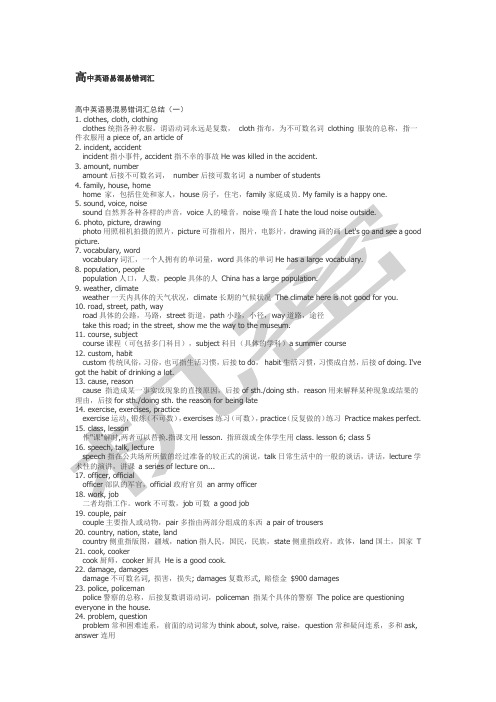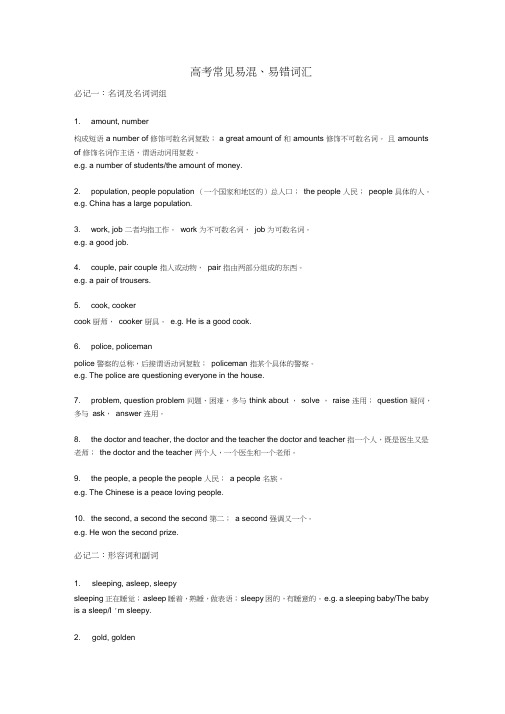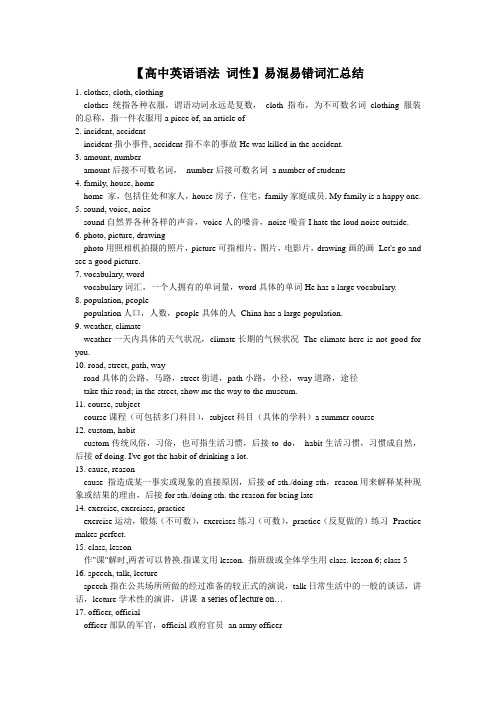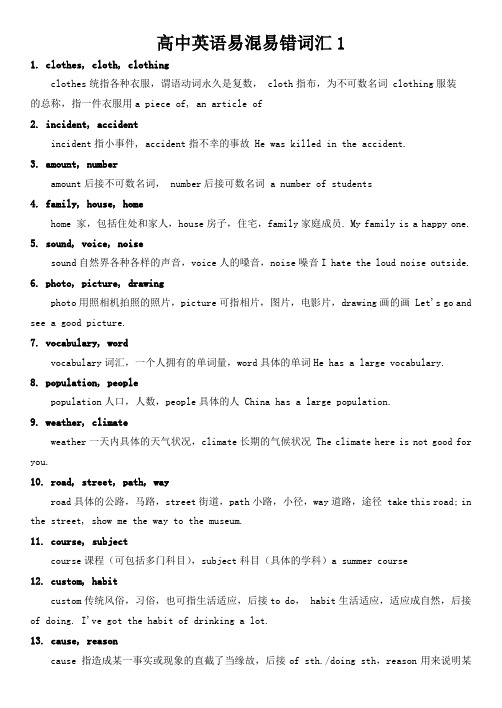高中英语易错词汇
高中英语易混淆词汇

高中英语易混易错词汇高中英语易混易错词汇总结(一)1. clothes, cloth, clothingclothes统指各种衣服,谓语动词永远是复数,cloth指布,为不可数名词clothing 服装的总称,指一件衣服用a piece of, an article of2. incident, accidentincident指小事件, accident指不幸的事故He was killed in the accident.3. amount, numberamount后接不可数名词,number后接可数名词a number of students4. family, house, homehome 家,包括住处和家人,house房子,住宅,family家庭成员. My family is a happy one.5. sound, voice, noisesound自然界各种各样的声音,voice人的嗓音,noise噪音I hate the loud noise outside.6. photo, picture, drawingphoto用照相机拍摄的照片,picture可指相片,图片,电影片,drawing画的画Let's go and see a good picture.7. vocabulary, wordvocabulary词汇,一个人拥有的单词量,word具体的单词He has a large vocabulary.8. population, peoplepopulation人口,人数,people具体的人China has a large population.9. weather, climateweather一天内具体的天气状况,climate长期的气候状况The climate here is not good for you.10. road, street, path, wayroad具体的公路,马路,street街道,path小路,小径,way道路,途径take this road; in the street, show me the way to the museum.11. course, subjectcourse课程(可包括多门科目),subject科目(具体的学科)a summer course12. custom, habitcustom传统风俗,习俗,也可指生活习惯,后接to do,habit生活习惯,习惯成自然,后接of doing. I've got the habit of drinking a lot.13. cause, reasoncause 指造成某一事实或现象的直接原因,后接of sth./doing sth,reason用来解释某种现象或结果的理由,后接for sth./doing sth. the reason for being late14. exercise, exercises, practiceexercise运动,锻炼(不可数),exercises练习(可数),practice(反复做的)练习Practice makes perfect.15. class, lesson作"课"解时,两者可以替换.指课文用lesson. 指班级或全体学生用class. lesson 6; class 516. speech, talk, lecturespeech指在公共场所所做的经过准备的较正式的演说,talk日常生活中的一般的谈话,讲话,lecture学术性的演讲,讲课a series of lecture on...17. officer, officialofficer部队的军官,official政府官员an army officer18. work, job二者均指工作。
高考英语必考常见易混易错词汇

高考常见易混、易错词汇必记一:名词及名词词组1. amount, number构成短语a number of 修饰可数名词复数;a great amount of 和amounts 修饰不可数名词。
且amounts of 修饰名词作主语,谓语动词用复数。
e.g. a number of students/the amount of money.2. population, people population (一个国家和地区的)总人口;the people 人民;people 具体的人。
e.g. China has a large population.3. work, job 二者均指工作。
work 为不可数名词,job 为可数名词。
e.g. a good job.4. couple, pair couple 指人或动物,pair 指由两部分组成的东西。
e.g. a pair of trousers.5. cook, cookercook 厨师,cooker 厨具。
e.g. He is a good cook.6. police, policemanpolice 警察的总称,后接谓语动词复数;policeman 指某个具体的警察。
e.g. The police are questioning everyone in the house.7. problem, question problem 问题、困难,多与think about ,solve ,raise 连用;question 疑问,多与ask,answer 连用。
8. the doctor and teacher, the doctor and the teacher the doctor and teacher 指一个人,既是医生又是老师;the doctor and the teacher 两个人,一个医生和一个老师。
9. the people, a people the people 人民;a people 名族。
高中英语语法 词性 易混易错词汇总结

【高中英语语法词性】易混易错词汇总结1. clothes, cloth, clothingclothes统指各种衣服,谓语动词永远是复数,cloth指布,为不可数名词clothing 服装的总称,指一件衣服用a piece of, an article of2. incident, accidentincident指小事件, accident指不幸的事故He was killed in the accident.3. amount, numberamount后接不可数名词,number后接可数名词a number of students4. family, house, homehome 家,包括住处和家人,house房子,住宅,family家庭成员. My family is a happy one.5. sound, voice, noisesound自然界各种各样的声音,voice人的嗓音,noise噪音I hate the loud noise outside. 6. photo, picture, drawingphoto用照相机拍摄的照片,picture可指相片,图片,电影片,drawing画的画Let's go and see a good picture.7. vocabulary, wordvocabulary词汇,一个人拥有的单词量,word具体的单词He has a large vocabulary.8. population, peoplepopulation人口,人数,people具体的人China has a large population.9. weather, climateweather一天内具体的天气状况,climate长期的气候状况The climate here is not good for you.10. road, street, path, wayroad具体的公路,马路,street街道,path小路,小径,way道路,途径take this road; in the street, show me the way to the museum.11. course, subjectcourse课程(可包括多门科目),subject科目(具体的学科)a summer course12. custom, habitcustom传统风俗,习俗,也可指生活习惯,后接to do,habit生活习惯,习惯成自然,后接of doing. I've got the habit of drinking a lot.13. cause, reasoncause 指造成某一事实或现象的直接原因,后接of sth./doing sth,reason用来解释某种现象或结果的理由,后接for sth./doing sth. the reason for being late14. exercise, exercises, practiceexercise运动,锻炼(不可数),exercises练习(可数),practice(反复做的)练习Practice makes perfect.15. class, lesson作"课"解时,两者可以替换.指课文用lesson. 指班级或全体学生用class. lesson 6; class 5 16. speech, talk, lecturespeech指在公共场所所做的经过准备的较正式的演说,talk日常生活中的一般的谈话,讲话,lecture学术性的演讲,讲课a series of lecture on…17. officer, officialofficer部队的军官,official政府官员an army officer18. work, job二者均指工作。
高中英语易混易错词汇总结及测试题(包括答案)全国通用

高中英语易混易错词汇总结(一)1. clothes, cloth, clothingclothes统指各种衣服,谓语动词永远是复数,cloth指布,为不可数名词clothing 服装的总称,指一件衣服用a piece of, an article of2. incident, accidentincident指小事件, accident指不幸的事故He was killed in the accident.3. amount, numberamount后接不可数名词,number后接可数名词a number of students4. family, house, homehome 家,包括住处和家人,house房子,住宅,family家庭成员. My family is a happy one.5. sound, voice, noisesound自然界各种各样的声音,voice人的嗓音,noise噪音I hate the loud noise outside. 6. photo, picture, drawingphoto用照相机拍摄的照片,picture可指相片,图片,电影片,drawing画的画Let's go and see a good picture.7. vocabulary, wordvocabulary词汇,一个人拥有的单词量,word具体的单词He has a large vocabulary.8. population, peoplepopulation人口,人数,people具体的人China has a large population.9. weather, climateweather一天内具体的天气状况,climate长期的气候状况The climate here is not good for you.10. road, street, path, wayroad具体的公路,马路,street街道,path小路,小径,way道路,途径take this road; in the street, show me the way to the museum.11. course, subjectcourse课程(可包括多门科目),subject科目(具体的学科)a summer course12. custom, habitcustom传统风俗,习俗,也可指生活习惯,后接to do,habit生活习惯,习惯成自然,后接of doing. I've got the habit of drinking a lot.13. cause, reasoncause 指造成某一事实或现象的直接原因,后接of sth./doing sth,reason用来解释某种现象或结果的理由,后接for sth./doing sth. the reason for being late14. exercise, exercises, practiceexercise运动,锻炼(不可数),exercises练习(可数),practice(反复做的)练习Practice makes perfect.15. class, lesson作"课"解时,两者可以替换.指课文用lesson. 指班级或全体学生用class. lesson 6; class 5 16. speech, talk, lecturespeech指在公共场所所做的经过准备的较正式的演说,talk日常生活中的一般的谈话,讲话,lecture学术性的演讲,讲课a series of lecture on…17. officer, officialofficer部队的军官,official政府官员an army officer18. work, job二者均指工作。
高中英语易混易错词汇1

高中英语易混易错词汇11. clothes, cloth, clothingclothes统指各种衣服,谓语动词永久是复数, cloth指布,为不可数名词 clothing服装的总称,指一件衣服用a piece of, an article of2. incident, accidentincident指小事件, accident指不幸的事故 He was killed in the accident.3. amount, numberamount后接不可数名词, number后接可数名词 a number of students4. family, house, homehome 家,包括住处和家人,house房子,住宅,family家庭成员. My family is a happy one.5. sound, voice, noisesound自然界各种各样的声音,voice人的嗓音,noise噪音I hate the loud noise outside.6. photo, picture, drawingphoto用照相机拍照的照片,picture可指相片,图片,电影片,drawing画的画 Let's go and see a good picture.7. vocabulary, wordvocabulary词汇,一个人拥有的单词量,word具体的单词He has a large vocabulary.8. population, peoplepopulation人口,人数,people具体的人 China has a large population.9. weather, climateweather一天内具体的天气状况,climate长期的气候状况 The climate here is not good for you.10. road, street, path, wayroad具体的公路,马路,street街道,path小路,小径,way道路,途径 take this road; in the street, show me the way to the museum.11. course, subjectcourse课程(可包括多门科目),subject科目(具体的学科)a summer course12. custom, habitcustom传统风俗,习俗,也可指生活适应,后接to do, habit生活适应,适应成自然,后接of doing. I've got the habit of drinking a lot.13. cause, reasoncause 指造成某一事实或现象的直截了当缘故,后接of sth./doing sth,reason用来说明某种现象或结果的理由,后接for sth./doing sth. the reason for being late14. exercise, exercises, practiceexercise运动,锤炼(不可数),exercises练习(可数),practice(反复做的)练习 Practice makes perfect.15. class, lesson作"课"解时,两者能够替换.指课文用lesson. 指班级或全体学生用class. lesson 6; class 5 16. speech, talk, lecturespeech指在公共场所所做的通过预备的较正式的演说,talk日常生活中的一样的谈话,讲话,lecture学术性的演讲,讲课a series of lecture on…17. officer, officialofficer部队的军官,official政府官员 an army officer18. work, job二者均指工作。
【高中英语语法 词性】易混易错词汇总结

2. incident, accident
s killed in the accident.
3. amount, number
amount后接不可数名词, number后接可数名词 a number of students
牛津考试资源网 助您教考无忧
【高中英语语法 词性】易混易错词汇总结
1. clothes, cloth, clothing
clothes统指各种衣服,谓语动词永远是复数, cloth指布,为不可数名词 clothing 服装的总称,指一件衣服用a piece of, an article of
14. exercise, exercises, practice
exercise运动,锻炼(不可数),exercises练习(可数),practice(反复做的)练习 Practice makes perfect.
15. class, lesson
牛津教育考试资源网
roadpath小路,小径,way道路,途径
,subject科目(具体的学科)a summer course
to do, habit生活习惯,习惯成自然,后接 cause 指造成某一事实或现象的直接原因,后接of sth./doing sth,reason用来解释某种现象或结果的理由,后接for sth./doing sth. the reason for being late
4. family, house, home
home 家,包括住处和家人,house房子,住宅,family家庭成员5. sound, voice, noise
sound自然界各种各样的声音,voice人的嗓音,noise噪音6. photo, picture, drawing
【高中英语】高一必备:高一英语易混易错词汇总结
【高中英语】高一必备:高一英语易混易错词汇总结高中英语学习方法:高一英语语法专项辅导:宾语从句,希望对大家有所帮助。
高一必备:高一英语易混易错词汇总结1. clothes, cloth, clothingclothes统指各种衣服,谓语动词永远是复数,cloth指布,为不可数名词clothing 服装的总称,指一件衣服用a piece of, an article of2. incident, accidentincident指小事件,accident指不幸的事故 He was killed in the accident.3. amount, numberamount后接不可数名词,number后接可数名词 a number of students4. family, house, homehome 家,包括住处和家人,house房子,住宅,family家庭成员. My family is a happy one.5. sound, voice, noisesound自然界各种各样的声音,voice人的嗓音,noise噪音I hate the loud noise outside.6. photo, picture, drawingphoto用照相机拍摄的照片,picture可指相片,图片,电影片,drawing画的画 Let's go and see a good picture.7. vocabulary, wordvocabulary词汇,一个人拥有的单词量,He has a large vocabulary.word具体的单词8. population, peoplepopulation人口,人数,China has a large population.people具体的人9. weather, climateweather一天内具体的天气状况,climate长期的气候状况 The climate here is not good for you.10. road, street, path, wayroad具体的公路,马路, street街道,path小路,小径, way道路,途径take this road; in the street, show me the way to the museum.11. course, subjectcourse课程(可包括多门科目),subject科目(具体的学科)a summer course12. custom, habitcustom传统风俗,习俗,也可指生活习惯,后接to do,habit生活习惯,习惯成自然,后接of doing. I've got the habit of drinking a lot.13. cause, reasoncause 指造成某一事实或现象的直接原因,后接of sth./doing sth,reason用来解释某种现象或结果的理由,后接for sth./doing sth. the reason for being late14. exercise, exercises, practiceexercise运动,锻炼(不可数),exercises练习(可数),practice(反复做的)练习 Practice makes perfect.15. class, lesson作“课”解时,两者可以替换.指课文用lesson. 指班级或全体学生用class.感谢您的阅读,祝您生活愉快。
高中英语常见易错单词清单
高中英语常见易错单词清单A 1.about 熟义:关于We spent the whole afternoon walking about town.prep.&adv.到处=(美)around2. absent 熟义:adj. 缺席的He looked at me in an absent way. adj. 茫然的,恍惚的3. abuse 熟义:v 滥用,谩骂She is quite a successful career woman, but actually she's much abused at home. v. 虐待 4.accept vt.&vi.①同意(接受别人的观点,看法)(熟义:接受)T om accepted her explanation.汤姆同意她的解释。
②认可,领受,认为I accept that the aircraft has no choice but to crash into the sea.飞机只有坠入大海,别无他法,我只好认命了。
5. accommodate 熟义:住宿,留宿This hotel can accommodate more than 5oo guests. vt 容纳He accommodated me when I asked him for help. v. 准予,提供6. ache 熟义:v/n 疼痛He was aching for home. v. 渴望7.act vi.熟义:行动It takes a couple of minutes for the drug to act.(vi.起作用)只需几分钟,药物就起作用了。
8. acknowledge 熟义:vt. 承认,道谢He acknowledged me by lifting his hat. vt. 对...打招呼9. across 熟义:prep. 越过The two roads cut across each other. prep. 与...交叉,与...成十字10. advance 熟义:v/n 前进,推进she asked me for an advance on her salary. n. 预付(款) Share prices showed significant advances today. n. 增加11.add 熟义:加“They don't know.”he added.vt.接着说,又说;补充说 12.address vt.①称呼(熟义:地址,写地址)The president should be addressed as“Mr President.”总统应称为“总统先生”。
【高中英语】高一必备:高一英语易混易错词汇总结一
【高中英语】高一必备:高一英语易混易错词汇总结一高中英语学习方法:高一必备:高一英语易混易错词汇总结一,希望对大家有所帮助。
高一必备:高一英语易混易错词汇总结一1.clothes,cloth,clothingclothes统指各种衣服,谓语动词永远是复数,cloth指布,为不能可数名词clothing服装的总称,指一件衣服用apieceof,anarticleof2.incident,accidentincident指小事件,accident指意外的事故hewaskilledintheaccident.3.amount,numberamount后可不可以可数名词,number后接可数名词anumberofstudents4.family,house,homehome家,包括住处和家人,house房子,住宅,family家庭成员.myfamilyisahappyone.5.sound,voice,noisesound自然界各种各样的声音,voice人的嗓音,noise噪音ihatetheloudnoiseoutside.6.photo,picture,drawingphoto用照相机拍摄的照片,picture可以指相片,图片,电影片,drawing画的画let'sgoandseeagoodpicture.7.vocabulary,wordvocabulary词汇,一个人拥有的单词量,hehasalargevocabulary.word具体内容的单词8.population,peoplepopulation人口,人数,chinahasalargepopulation.people具体的人9.weather,climateweather一天内具体的天气状况,climate长期的气候状况theclimatehereisnotgoodforyou.10.road,street,path,wayroad具体内容的公路,马路,street街道,path小路,小径,way道路,途径takethisroad;inthestreet,showmethewaytothemuseum.11.course,subjectcourse课程(可以包含多门科目),subject科目(具体的学科)asummercourse12.custom,habitcustom传统风俗,习俗,也可指生活习惯,后接todo,habit生活习惯,习惯成自然,后直奔ofdoing.i'vegotthehabitofdrinkingalot.13.cause,reasoncause指导致某一事实或现象的直接原因,后直奔ofsth./doingsth,reason用来解释某种现象或结果的理由,后接forsth./doingsth.thereasonforbeinglate14.exercise,exercises,practiceexercise运动,锻炼(不可数),exercises练(可数),practice(反反复复搞的)练practicemakesperfect.15.class,lesson并作“课”解时,两者可以替代.指课文用lesson.指班级或全体学生用class.。
高考英语易混易错词汇辨析200组
高考英语易混易错词汇辨析200组1. clothes, cloth, clothingclothes统指各种衣服,谓语动词永远是复数, cloth指布,为不可数名词clothing 服装的总称,指一件衣服用a piece of, an article of2. incident, accidentincident指小事件, accident指不幸的事故He was killed in the accident.3. amount, numberamount后接不可数名词, number后接可数名词 a number of students 4. family, house, homehome 家,包括住处和家人,house房子,住宅,family家庭成员. My family is a happy one. 5. sound, voice, noisesound自然界各种各样的声音,voice人的嗓音,noise噪音I hate the loud noise outside. 6. photo, picture, drawingphoto用照相机拍摄的照片,picture可指相片,图片,电影片,drawing画的画 Let's go and see a good picture.7. vocabulary, wordvocabulary词汇,一个人拥有的单词量,word具体的单词He has a large vocabulary. 8. population, peoplepopulation人口,人数,people具体的人 China has a large population. 9. weather, climateweather一天内具体的天气状况,climate长期的气候状况 The climate here is not good for you.10. road, street, path, wayroad具体的公路,马路,street街道,path小路,小径,way道路,途径take this road; in the street, show me the way to the museum.11. course, subjectcourse课程(可包括多门科目),subject科目(具体的学科)a summer course 12. custom, habitcustom传统风俗,习俗,也可指生活习惯,后接to do, habit生活习惯,习惯成自然,后接of doing. I've got the habit of drinking a lot. 13. cause,reasoncause 指造成某一事实或现象的直接原因,后接of sth./doing sth,reason用来解释某种现象或结果的理由,后接for sth./doing sth. the reason for being late 14. exercise, exercises, practiceexercise运动,锻炼(不可数),exercises练习(可数),practice(反复做的)练习 Practice makes perfect.15. class, lesson作"课"解时,两者可以替换.指课文用lesson. 指班级或全体学生用class. lesson 6; class 5 16. speech, talk, lecturespeech指在公共场所所做的经过准备的较正式的演说,talk日常生活中的一般的谈话,讲话,lecture学术性的演讲,讲课 a series of lecture on…17. officer, officialofficer部队的军官,official政府官员 an army officer18. work, job二者均指工作。
- 1、下载文档前请自行甄别文档内容的完整性,平台不提供额外的编辑、内容补充、找答案等附加服务。
- 2、"仅部分预览"的文档,不可在线预览部分如存在完整性等问题,可反馈申请退款(可完整预览的文档不适用该条件!)。
- 3、如文档侵犯您的权益,请联系客服反馈,我们会尽快为您处理(人工客服工作时间:9:00-18:30)。
1. I slept away the morning when the alarm clock didn't go____.A. offB. awayC. outD. by2. Mr. Jones was thinking about quitting his job, but his wife told him not to go ____at half cock.A. offB. awayC. outD. by3. We had to explore the terrain carefully lest booby traps go ____ all around us.A. offB. awayC. outD. by4. He had to go___the post office on his way to school, so he mailed the letter.A. offB. awayC. outD. by5. I've decided to switch ___from the buses to the underground because it is more reliable.A. awayB. overC. onD. off6. My ears have been pounded on for the past hour; when is he going to switch___ that damned drill?A. onB. offC. upD. down7. If a person could ___ , take away, multiply and divide, he could do everything else.A. add upB. addC. add up toD. add to8. Since the law says that for every action there is an equal and opposite reaction, all forces___zero.A. increase toB. equal toC. add up toD. add to9. All Party cadres should be concerned ___the country and the people before anything else; they should be the first to bear hardships and the last to enjoy themselves.A. forB. inC. aboutD. to10. There was no salvation: she would have to ___with it.A. go throughB. go awayC. break awayD. break through11. "I don't want to take ___ much of your time, Colonel," Thomas said. AAADB BACCAA. awayB. inC. upD. care12. Can you recommend a comrade who can take ___ the job?A. awayB. inC. upD. care13. Person may ___ loneliness, fear, anxiety, or other emotional responses to stress.A. suffer fromB. suffer underC. suffer atD. suffer through14. When we issue a ___ , we are specifying the verb-the action of the statement.A. recommendB. commentC. commandD. conduct15. I'm sure he stints himself at lunch on ___ when he knows he is coming here for tea.A. purposeB. timeC. situationD. case16. That is enough for the ___ ; he lives in the ___ with no thought of tomorrow.A. present, presentB. moment, momentC. situation, situationD. gift, gift17. We love Miss Joan's class because she always ___ us with rich knowledge and mysteries.A. presentsB. suppliesC. fillsD. provide18. CCACA AA1). Agnes came _____ Vanqy first in Beijing.2). Come _____, try it again. You can be the winner.3). How long is it since the electronic computer came _____ use?4). The trees turn green and flowers come _____.5). This school magazine comes _____ once a month.6). Someday you'll come _____ know the mistakes you have made.7). As soon as their party came _____ power they changed the law.8). The scientists are beating their brains trying to come _____ a solution to the problem.9). The new tax regulations came _____ effect last month.A. toB. acrossC. intoD. onE. outF. up with19. Almost anyone who has a steady income and a continuous work record can ___ a credit card.A. apply toB. apply forC. apply inD. Apply BDCEEACFC20. It was then, in a ___ of confidence, that he told Celia about missing Joanna.A. burstB. supportC. presenceD. absence21. Of course we're sure; ___ , we wouldn't have asked. It shouldn't second-guess us or itself.A. otherwiseB. thusC. howeverD. nevertheless22. The doctor had almost lost hope at one point, but the patient finally ___ .A. pulled outB. pulled upC. pulled throughD. pulled over23. Suppose he ______ the truth, how shall we deal with him?A. won't tellB. didn't tellC. doesn't tellD. hadn't told24. - You ______ part in the party in time.- Sorry, I was delayed by the accident.A. are supposed to takeB. have supposed to takeC. are supposed to have takenD. supposed to take25. I'd like to go to the cinema, but, I'm ___ to.A. enableB. disableC. unableD. able26. Do come to my party, and bring your sister ___ .A. as goodB. as a wholeC. as wellD. instead27. She also learned a kind of alphabet for the blind, in which different finger positions___ different letters of the alphabet.A. stand inB. stand forC. stand byD. stand out28. The classroom is big enough ________ , but we'll have to move if we have more students.A. for the momentB. on the momentC. in a momentD. for a moment29. A large ___ is offered for the capture of the criminals.A. scholarshipB. incomeC. paymentD. reward30. This payment will ___ you from any further obligation to the company.A. releaseB. increaseC. decreaseD. relieve BAACCC CCBAD A。
